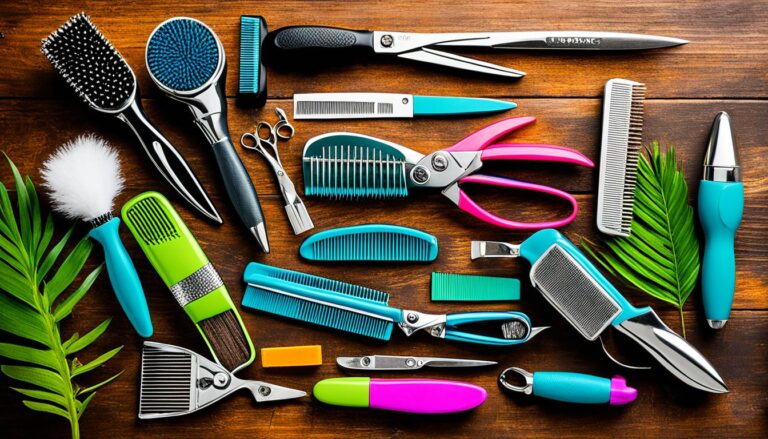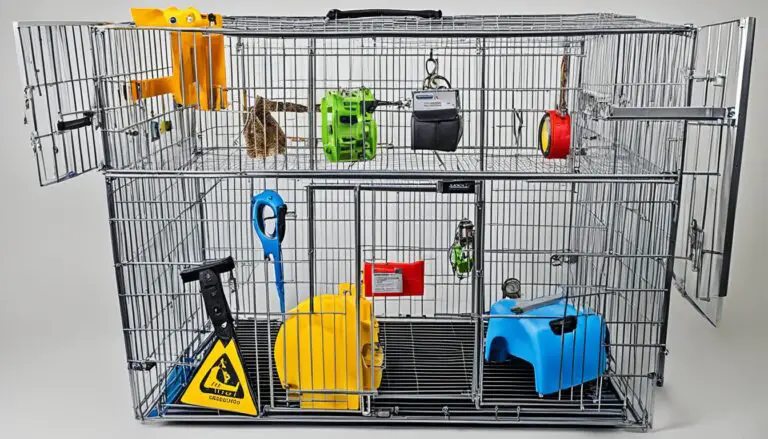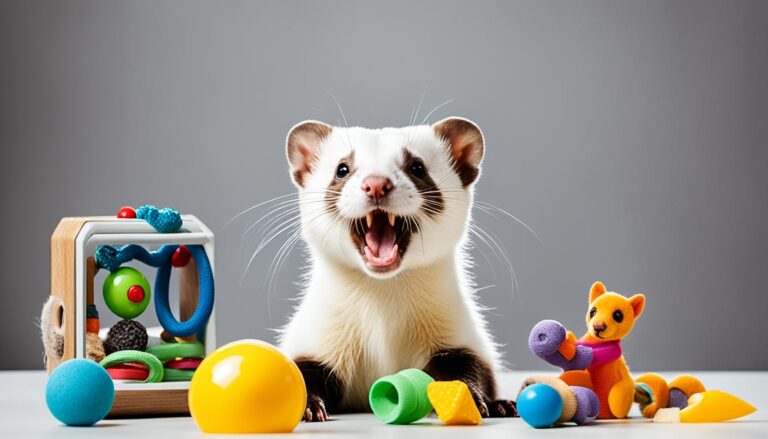Exotic Pet Diet and Feeding Tips for Healthy Pets
Did you know that many health problems in exotic pets come from bad food? Things like not enough calcium or missing vitamins can hurt them. So, it’s very important to feed them right.
Different types of exotic pets, like birds or reptiles, need different foods. If they don’t get the right kind of food, they can get sick. For example, they might have trouble with their teeth, get too fat, or have other health issues.
But, there’s good news! You can make sure your pet is healthy by learning and getting advice from experts. Specialized veterinarians can help you figure out the best diet for your furry, feathery, or scaly friend. This way, they will be happy and healthy.
Key Takeaways:
- Exotic pets need different foods, so you should do your homework to feed them well.
- Bad food can cause serious health problems like a lack of calcium or vitamins.
- It’s smart to talk to pros and use credible resources for the best diet and feeding plans.
- Remember, each exotic pet has their own food needs, so know what’s best for yours.
- A good, balanced diet will keep your exotic pet in top shape, both inside and out.
Understanding Exotic Pet Nutrition
For exotic pets, the right food is key to being healthy and happy. Each animal needs a special diet. Keeping up with feeding times is important.
Nutrition for these pets stops big health issues. Things like bad bones, vitamin problems, and leg issues can be avoided. A good diet plan from the pros makes sure your pet gets what it needs.
Exotic pets eat differently. Some like plants while others eat meat or a bit of both. Learning about your pet’s diets is vital.
Talking to pet food experts can help a lot. They know what meals are best. They can tell you how much and how often to feed your pet.
Benefits of a Proper Exotic Pet Diet
The right diet means your pet will be healthier and live longer. Here’s how a good diet helps:
- Promoting proper growth and development
- Preventing nutritional deficiencies
- Supporting a strong immune system
- Improving digestion and nutrient absorption
- Maintaining a healthy weight
- Enhancing energy levels and activity
Choosing the best commercial pet food is vital. It must be made just for your pet. These meals give your pet all the vitamins they need.
Quote: “Proper nutrition is the foundation of good health for exotic pets. Providing a well-planned diet and adhering to a regular feeding schedule is essential for their overall well-being.” – Dr. Jane Johnson, Exotic Pet Nutrition Specialist
Some exotic pets also need extra vitamins. But only use these with advice from a vet.
Establishing an Exotic Pet Feeding Schedule
Exotic pets like a routine. A regular meal plan makes them feel safe. It also stops them from eating too much or too little. Your pet’s type, age, and health will shape their meal times.
Some pets, like reptiles, eat once a day. Birds and small animals may need food several times. Know your pet to get their feeding times right.
| Exotic Pet Species | Feeding Schedule |
|---|---|
| Bearded Dragons | Offer a variety of insects, fruits, and vegetables daily. |
| Parrots | Provide fresh fruits, vegetables, pellets, and occasional treats twice a day. |
| Rabbits | Offer unlimited hay, fresh vegetables, and a small portion of pellets daily. |
| Tortoises | Provide a mixture of leafy greens, vegetables, and occasional fruits every other day. |
Checking on your pet’s eating and weight is important. A vet can help if you’re worried or need info on what and when to feed.
Finding out what your exotic pet should eat is crucial. The right advice can make feeding them easy. With good help, you can keep your pet healthy and happy.
Researching Exotic Pet Dietary Needs
Before you bring an exotic pet home, be sure to research what they eat. Different species need different food. It’s key to give them the right diet to do well.
Getting advice from vets and consulting good resources is smart. They know a lot about what exotic pets need to eat. They can guide you to make the best food choices.
Also, using recommended food brands helps your pet’s health. Find brands made for exotic pets. These foods are full of the nutrients pets need to be healthy.
Think about how your pet likes to eat when picking their food. Some pets eat live food, others need a special diet. Knowing what your pet naturally eats helps you choose the right food.
Recommended Exotic Pet Food Brands
There are many good food brands for exotic pets. Some of the top choices are:
| Brand | Recommended For | Description |
|---|---|---|
| ZuPreem | Exotic Birds and Small Mammals | ZuPreem has diets for exotic birds and small mammals. They make sure the pets get the right nutrients. |
| Oxbow | Rabbits, Guinea Pigs, and Chinchillas | Oxbow makes hay, pellets, and treats for rabbits, guinea pigs, and chinchillas. It meets their dietary needs. |
| Mazuri | Reptiles, Amphibians, and Insects | Mazuri has special diets for reptiles, amphibians, and insects. Their food provides the needed nutrition. |
Remember, consult with a vet to choose the best food for your pet. They can give personalized advice for your pet’s well-being.
Choosing the right food is crucial. By following feeding guidelines and seeking expert advice, your pet will be well-fed and happy.

Common Nutritional Issues in Exotic Pets
Proper nutrition is crucial for exotic pets’ health and well-being. Bad feeding can cause nutrition issues and harm their health. Knowing what your exotic pet needs to eat is key to avoiding common problems.
Vitamin Deficiencies
Exotic pet health diet might lack some vitamins, leading to health troubles. Animals that need special vitamins for body processes get weak. Their immune system lowers, making them prone to illnesses.
Vets recommend a well-rounded diet for exotic pets. It should have all needed nutrients. Adding vitamins can fill any gaps and boost your pet’s health.
Calcium Disorders
Reptiles and birds, like in metabolic bone disease, need the right calcium-phosphorus balance. Wrong amounts can cause bone and metabolic problems. They might have brittle bones or fractures.
Diets for reptiles and birds should be high in calcium. Include calcium-rich veggies, insects, and supplements. This keeps their bones strong and healthy.
Dental Problems
Animals with teeth that keep growing, like rabbits, need to chew. If they can’t chew enough, it causes dental issues. A good diet and chewing on things help them keep their teeth healthy.
Rabbit diets should include lots of hay and veg for chewing. This helps rabbits keep their teeth in good shape, avoiding problems.
Obesity
Overfeeding and high-fat diets cause obesity in exotic pets. This can harm their joints and heart. It also shortens their life.
Healthy pets need the right amount of food and active play. Too many treats or too little exercise can make them overweight. This affects their health.
Knowing about and dealing with these nutritional issues can keep exotic pets healthy. Always talk to a vet who understands their special dietary needs. A good vet will help you make a diet plan that’s right for your pet.
| Common Nutritional Issues | Causes | Prevention |
|---|---|---|
| Vitamin Deficiencies | Insufficient intake of essential vitamins | Provide a balanced and varied diet, consider vitamin supplementation |
| Calcium Disorders | Imbalance of calcium and phosphorus in the diet | Offer a calcium-rich diet and appropriate supplements, maintain proper calcium-phosphorus ratio |
| Dental Problems | Lack of proper dental wear from an inappropriate diet | Provide chew-appropriate foods and materials for natural dental wear |
| Obesity | Excessive intake of calories and lack of exercise | Control portion sizes, offer a balanced diet, and provide regular exercise |
The Importance of Balanced Exotic Pet Diets
Exotic pets need special diets to stay healthy. It’s important to feed them foods similar to what they eat in the wild. The right diet varies by the type of exotic pet and its needs.
Some unusual pets, like tortoises or iguanas, eat only plants. They need lots of fruits, veggies, and greens. This helps their digestion and stops health problems. Making sure they get enough calcium is key to avoiding a serious bone disease.
But, other exotic animals, like certain reptiles, also eat meat. They need a mix of good proteins, fats, and nutrients. Bearded dragons, for example, eat bugs, meats, and greens to stay healthy.
It’s smart to talk to a vet who knows about exotic animals for the best advice on what to feed your pet. They can give you tips on what and how much to feed them. Books about exotic pet care and nutrition can also be helpful.
“Providing a balanced diet with the right mix of proteins, carbohydrates, and fats is crucial in meeting the dietary needs of exotic pets.” – Dr. Emily Johnson, Exotic Pet Specialist
Feeding Guidelines for Exotic Pets
Feeding exotic pets right means keeping a schedule and giving them the same food all the time. They might need to eat several times a day, depending on the type of animal.
- Work with a vet to set a feeding plan for your pet.
- Give them many different foods to keep their diet interesting and healthy.
- Don’t give them too much food, and watch their weight to avoid obesity.
- Always have clean water available for them.
Creating a Balanced Diet
To make a good diet for your exotic pet, focus on proteins, carbs, and fats they need. Here’s a simple guide to follow:
| Component | Examples |
|---|---|
| Proteins | Lean meats, insects, fish, tofu |
| Carbohydrates | Fresh fruits, vegetables, whole grains |
| Fats | Avocado, nuts, seeds, fish oil |
Each pet’s diet may need different amounts of each group. Check their health often and talk to a vet to keep the diet right for them.
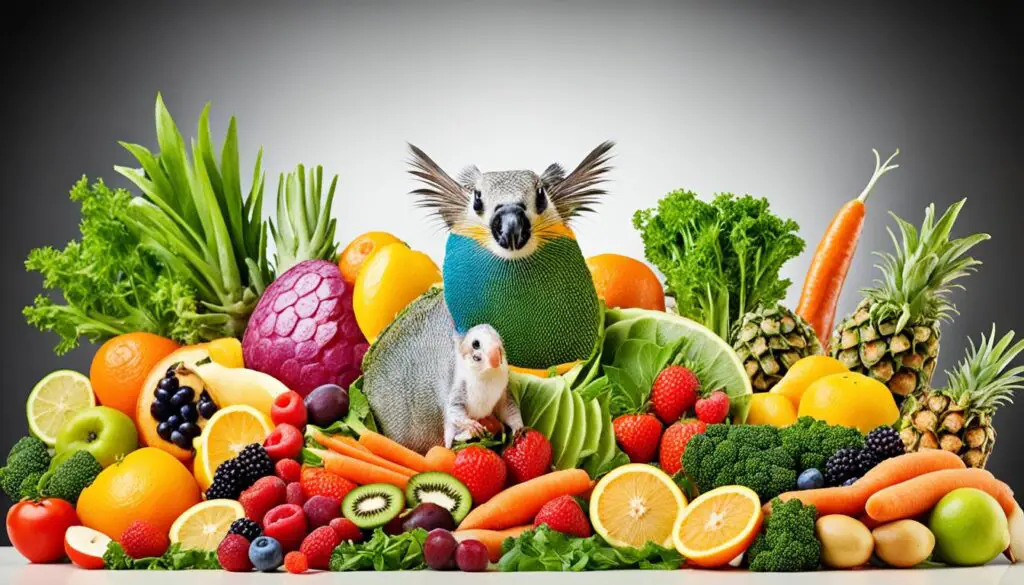
Feeding exotic pets well is crucial for their health. Vets and good resources can help you make the best diet for your unusual friend. This way, they can live a long, healthy life.
Establishing a Feeding Schedule for Exotic Pets
Creating a feeding schedule for exotic pets is key for their health. It ensures they eat regularly and get the nutrition they need. The type of food and how often you feed them depends on the animal. Some need several meals a day, others only need to eat once a week. Knowing what your exotic pet likes to eat will guide you in setting up the right schedule.
To make a good meal plan for exotic pets, think about this:
- What each species likes to eat
- How they eat in the wild
- Nutritional needs at different life stages like when they’re growing, reproducing, or maintaining
It’s a good idea to talk to vets and look at trusted sources for advice. They know a lot about what exotic animals need to eat. They can help you design a meal plan that’s just right for your pet.
Example Exotic Pet Feeding Schedule
Let’s look at a diet plan for a made-up exotic bird, called “Colorful Macaw”:
| Time | Meal |
|---|---|
| Morning | Fresh fruits and vegetables |
| Noon | Pelleted exotic bird food |
| Afternoon | Seeds and nuts |
| Evening | Protein source (e.g., cooked chicken) |
This plan keeps the Colorful Macaw healthy by offering a mix of foods. It ensures the bird gets all the nutrients it needs.
Remember, every exotic pet has its own diet needs. Getting advice from knowledgeable people is vital. They can help you make a meal plan that’s just right for your pet.
Proper Husbandry for Exotic Pets
Keeping exotic pets healthy and happy requires proper care. It means setting up the right environment, like the perfect temperature and amount of light. You should also think about the type of ground cover and the humidity in the air. All of these things are very important for exotic animals.
It’s also key to create the right living space. This includes hiding places, clean water, and fun things for them to do. A good home helps them stay physically and mentally well.
Getting advice from vets and trusted sources is very helpful. They can tell you what to feed your exotic pet and how to care for them. Listening to their expert tips makes sure your pet is happy and healthy in its home.
Enrichment and Well-Being for Exotic Pets
Enrichment is crucial for the well-being of exotic pets. It involves giving them various toys, activities, and chances to socialize. This helps their mental and physical health. A balanced diet is also key for their happiness and health.
To choose the right foods and activities, know what your pet needs. Vets and experienced owners can give you advice. They’ll help you pick the best food and toys for your pet.

“Enrichment is not a luxury, it is a necessity. It is an essential component of providing proper care for exotic pets. By creating an environment that encourages natural behaviors and mental stimulation, we can improve their overall well-being and prevent boredom-related issues.”
Recommended Foods for Exotic Pets
Choosing the right food is essential for your pet’s health. While each pet has unique needs, here are some general tips:
- Give food that’s like what they’d eat in the wild
- Think about their natural diet and cater to it
- Include fresh fruits, veggies, and proteins
- Stay away from unhealthy foods
Always talk to experts to find the best food for your pet.
Enrichment Activities for Exotic Pets
Keeping pets active and engaged is important. Here are some great activities:
- Puzzle feeders make eating fun and stimulating
- Toys that encourage movement and play are great
- Make their living space fun with spots to hide and things to climb
- Switch toys and add new ones to avoid boredom
- Let them socialize with others, under supervision
Incorporating Enrichment into Daily Routine
Make enrichment part of their everyday life with these tips:
- Play and stimulate them daily
- Change up their living space and toys often
- Reward good behavior to make enrichment activities more effective
- See what activities they like best and focus on those
A good diet and daily enrichment activities make for a happy pet. Enjoy your time with your exotic friend!
Exotic Pet Veterinary Care
Regular visits to the vet are key for exotic pets’ health. They are unique and have special needs. Annual check-ups, blood tests, and screening for parasites are crucial.
It’s vital to watch your exotic pet for any odd behavior between vet trips. Acting fast to get medical help can stop small problems from getting big.
Finding a vet who knows how to care for exotic animals is very important. These vets understand what your pet needs. They can help with diet, where your pet lives, and how to stop problems before they start.
Being alert and caring for your pet every day keeps them healthy. Watch how they act and if they eat and drink well. Make sure their home is always clean and safe. If you see something wrong, don’t wait. Get your pet to the vet right away. This will help keep them well.
Handling and Restraint of Exotic Pets
Learning how to handle exotic pets right is super important. It’s all about keeping them and you safe. Remember, each kind of exotic pet needs a different touch. So, knowing the best way to deal with them is a must.
For exotic pet handling, remember these tips:
- Always approach the exotic pet calmly and confidently to minimize stress.
- Respect the boundaries of the pet and avoid sudden movements.
- Use the right tools, like gloves, for safety and a secure hold.
- Learn the best ways to grab, lift, and hold the pet, including its head or paws.
- Get advice from pros on how to handle your specific exotic pet.
Handling different exotic pets means using various methods. For instance, you should support reptiles well. This keeps them from getting hurt. With birds, a soft yet firm touch works best. It’s smart to get advice from experts. They can show you the safest, calm methods for each pet type.
Tips for Minimizing Stress during Handling
To keep exotic pets happy, you need to reduce stress when handling them. Here are ways to do that:
- Handle your pet in a quiet, peaceful space, free from loud sounds and distractions.
- Introduce the pet to handling slowly, starting with brief sessions and increasing them bit by bit.
- Use treats or positive words to encourage good behavior.
- Watch how the pet responds. If they seem unhappy, stop and try again later.
Every exotic pet needs its own time to feel safe when being handled. Being patient and using a gentle touch is how you build trust. With time and care, you and your pet can get comfortable with handling.
“Proper handling techniques are crucial for ensuring the safety and well-being of both the handler and the exotic pet.”
To handle your exotic pet well, use the advice and steps we’ve discussed. Keep learning and talking to experts. This will make you a better, more confident pet owner. And give your pet a life without stress.
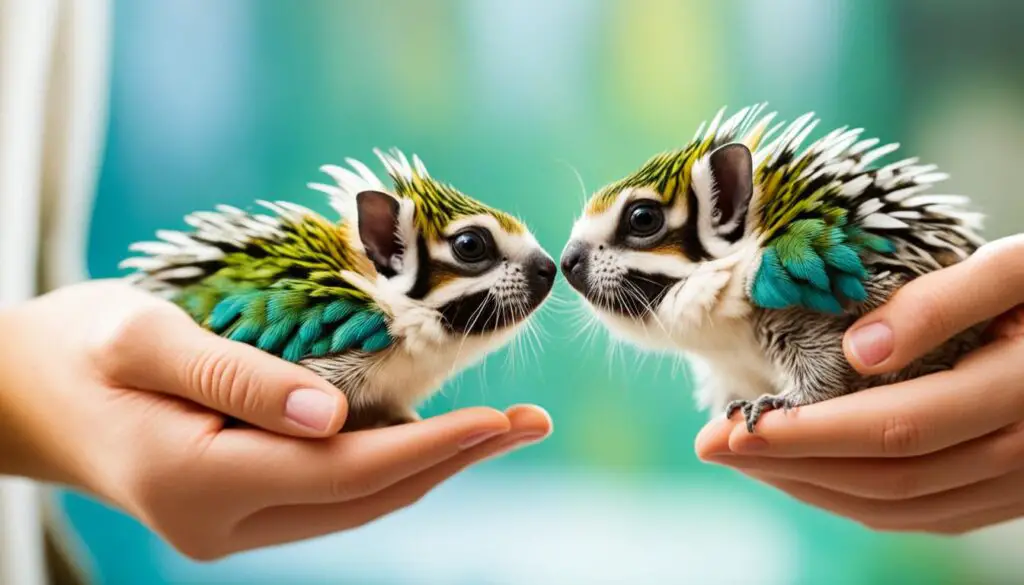
Creating a Safe and Enriching Environment for Exotic Pets
Exotic pets need a special environment for their well-being. Every part of their living space, from the temperature to the lighting, is important. Making sure they have the right conditions is vital for their health.
Regulating Temperature and Humidity
Many exotic pets come from places with unique climate needs. It’s key to match these conditions in their home. Devices like thermostats and humidity gauges are helpful. They help keep the environment just right for your pet.
Ensuring Escape-Proof Enclosures
Exotic pets may try to get out, making secure enclosures a must. Check that there are no gaps your pet can slip through. It’s also important to fix any worn parts of the enclosure quickly.
Removing Potential Hazards
Look out for anything in the enclosure that could harm your pet. This includes toxic plants and small, swallowable objects. Keep electrical cords out of reach. With a little care, you can make their space safer.
Hygiene and Cleanliness
Keeping the enclosure clean is essential for your pet’s health. Clean often and use pet-safe disinfectants. This prevents bacteria from growing. Remember, a clean space is also more pleasant for everyone.
Easy Access to Essential Resources
Make sure your exotic pet can easily find what they need. This includes clean water and a space to hide. Don’t forget to add toys and items that stimulate their mind. Changing these items regularly keeps them interested.
Expert advice from veterinarians can guide you on creating the perfect space for your pet. The environment you make is key to their happiness. With the right setup, your exotic pet can thrive.
Conclusion
Proper care is key for exotic pets to stay healthy. It’s crucial to know what they eat, when to feed them, and how their living space should be. This ensures they live their best life. Listening to advice from experts helps ensure they get the right nutrition.
It’s important to take exotic pets to the vet regularly. This helps keep them healthy and catch any problems early. Adding fun activities to their day helps keep their minds and bodies in shape. And learning how to handle them correctly keeps everyone safe.
Taking care of exotic pets involves many parts. This includes giving them the right food, seeing the vet often, and making their home interesting. It’s also about handling them safely. Doing all these things shows you love and value your exotic pet. This strengthens the bond you share with them for a long time.
FAQ
What are some tips for feeding exotic pets?
What are the common nutritional issues in exotic pets?
How can I establish a feeding schedule for my exotic pet?
What is the importance of balanced exotic pet diets?
How can I provide a safe and enriching environment for my exotic pet?
How often should I take my exotic pet to the veterinarian?
What should I consider when handling exotic pets?
Source Links
- https://www.happyhealthypets.com/pet-resources/comprehensive-guide-to-caring-for-exotic-pets
- https://www.theexoticvet.com/services/diet-nutrition
- https://www.oakhurstvet.com/blog/eating-right-understanding-exotic-pet-nutrition-and-feeding-habits/
Peter Stones is the founder of Exotic Pets Place, the leading online resource for exotic pet care information.
With over 10 years of hands-on exotic pet ownership experience, he is deeply passionate about sharing his expertise to help others properly care for their unusual pets.
When he's not writing extensively researched articles or connecting with fellow exotic pet enthusiasts worldwide, you can find Peter at home tending to his own beloved menagerie of exotic animals.




